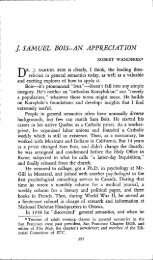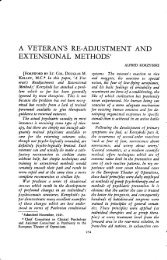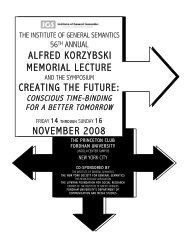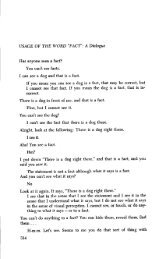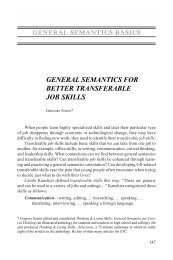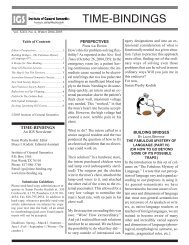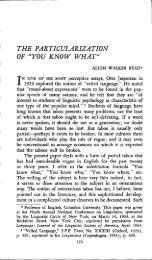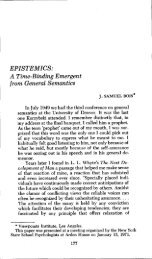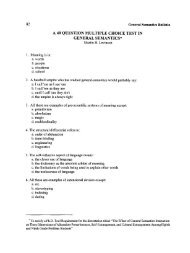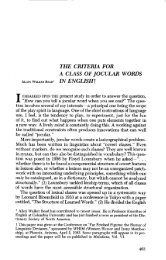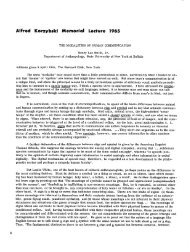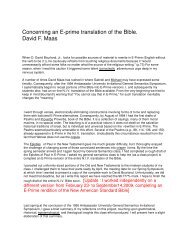WITTGENSTEIN AND GENERAL SEMANTICS - The Institute of ...
WITTGENSTEIN AND GENERAL SEMANTICS - The Institute of ...
WITTGENSTEIN AND GENERAL SEMANTICS - The Institute of ...
You also want an ePaper? Increase the reach of your titles
YUMPU automatically turns print PDFs into web optimized ePapers that Google loves.
SANFORD I . BERMAN-<br />
<strong>WITTGENSTEIN</strong> <strong>AND</strong><br />
<strong>GENERAL</strong> <strong>SEMANTICS</strong><br />
0 OTHER PHILOSOPHER has exerted a greater influence on twentiethcentury<br />
Anglo-American thought than Ludwig Wittgenstein . Alfred<br />
N<br />
Korzybski had only a few references to Wittgenstein's Tractatus Logico-<br />
Philosophicus in his Science and Sanity . And yet, there is a much greater<br />
relationship between the thinking <strong>of</strong> Wittgenstein and Korzybski than these<br />
references might suggest. I am sure that Korzybski would have considered some<br />
<strong>of</strong> the Tractatus as ambiguous or meaningless, as many <strong>of</strong> the analytic<br />
philosophers have done . But an analysis <strong>of</strong> Wittgenstein's philosophy should<br />
be <strong>of</strong> interest to the general semanticist .<br />
Wittgenstein said that all philosophy is "Critique <strong>of</strong> language" (4 .0031) and<br />
that philosophy is not one <strong>of</strong> the natural sciences . <strong>The</strong> object <strong>of</strong> philosophy<br />
is the logical clarification <strong>of</strong> thoughts . It is not a body <strong>of</strong> knowledge or a theory<br />
about the world based upon empirical investigation. Moreover, it is not a special<br />
knowledge <strong>of</strong> the ultimate nature <strong>of</strong> reality obtained a priori or by some extraempirical<br />
revelation . It is a language-clarifying activity . In other words, says<br />
Wittgenstein, philosophy is a pursuit <strong>of</strong> meaning and sense, and not <strong>of</strong> truth .<br />
<strong>The</strong> task <strong>of</strong> a philosopher is to see that all discourse complies with the<br />
following two conditions : (a) that it contain only the terms which have unique<br />
and unambiguous meaning being assigned either by explicit definitions or by<br />
pointing ; and (b) that its propositions be constructed according to the rules<br />
<strong>of</strong> our language, so as to make determinate sense. It is the duty <strong>of</strong> a philosopher<br />
to see that these conditions are complied with in all actual uses <strong>of</strong><br />
language, in everyday life, and in science, science being but an extension <strong>of</strong><br />
everyday life to more difficult and general cases .<br />
<strong>The</strong> unchanging purpose <strong>of</strong> all philosophizing is to make our language clear<br />
and unambiguous; to reject as meaningless all the statements for which we can<br />
*Sanford I . Berman, Ph .D., is Vice President <strong>of</strong> the International Society for General<br />
Semantics . An educator, President <strong>of</strong> Educational Cassettes, Inc ., and author <strong>of</strong> a number<br />
<strong>of</strong> books on general semantics, he lives in La Jolla, California .<br />
22
<strong>WITTGENSTEIN</strong> <strong>AND</strong> <strong>GENERAL</strong> <strong>SEMANTICS</strong> 23<br />
find no determinate meaning, and to make as clear and precise as we can those<br />
statements which are vague and ambiguous .<br />
<strong>The</strong> practice <strong>of</strong> Socrates was essentially in agreement with the philosophy<br />
<strong>of</strong> Wittgenstein . Socrates' method was not to give any information, but to make<br />
clear what was meant by asking certain questions concerning human nature<br />
and conduct . This method consisted <strong>of</strong> attempts to make clear the sense <strong>of</strong><br />
the propositions under consideration .<br />
For Wittgenstein, the pursuit <strong>of</strong> truth is the business <strong>of</strong> the activities <strong>of</strong><br />
everyday life and <strong>of</strong> its refined extension, science . But before we can proceed<br />
to ascertain the truth or falsehood <strong>of</strong> a proposition, whether in science or in<br />
everyday life, we must understand what the proposition says : "in order to be<br />
able to say `p' is true (or false) I must have determined under what conditions<br />
I call `p' true, and thereby I determine the sense <strong>of</strong> the proposition" (4 .063)<br />
It is the proper and the only business <strong>of</strong> philosophy to see to it that we<br />
understand the terms and propositions we use . Sometimes it happens that we<br />
proceed to try to verify a proposition without realizing that we are not clear<br />
as to what it says . Wittgenstein pointed out that such things have happened<br />
even in scientific investigations, for example, in dealing with "space" and "time"<br />
Thus Einstein was engaged in philosophic activity when he <strong>of</strong>fered a precise<br />
meaning to the term "simultaneity." In such a formal and nonfactual subject<br />
as mathematics much depends on clarifying lingustic confusions .<br />
Wittgenstein said that whenever and wherever we face any problem, one <strong>of</strong><br />
two things is possible : either (a) we understand the problem, or (b) we do not<br />
understand it . In the first situation there is no need <strong>of</strong> any philosophy, and<br />
the problem is to be solved by scientific methods . In the second situation we<br />
have to investigate the statement <strong>of</strong> the problem, and in doing this we can arrive<br />
at either <strong>of</strong> two results : (1) <strong>The</strong> problem after clarification becomes a genuine<br />
or real problem, which can be referred for further investigation to science ;<br />
or (2) it becomes no problem at all but a misunderstanding <strong>of</strong> our language<br />
that makes no sense to us .<br />
Wittgenstein pointed out that philosophers, even Bertrand Russell, have not<br />
always seen clearly the distinction between the pursuit <strong>of</strong> meaning and sense<br />
on the one hand, and the pursuit <strong>of</strong> truth about the world on the other,<br />
and the confusion <strong>of</strong> the two has resulted in a great deal <strong>of</strong> nonsensical<br />
disputation and literature .<br />
He believed that this confusion very probably had its roots in the historical<br />
fact that in ancient times philosophy was almost identical with the science <strong>of</strong><br />
the times . Ancient science was in an embryonic stage, its concepts vague and<br />
ambiguous, and therefore the activity <strong>of</strong> scientists was almost subsidiary to the<br />
clarification <strong>of</strong> the meanings <strong>of</strong> these concepts, that is, to the philosophical<br />
activity. It was natural that philosophy became the "first" or fundamental<br />
science <strong>of</strong> the essential nature <strong>of</strong> things . It was easy to believe that, in addition<br />
to the special empirical truths <strong>of</strong> sciences and <strong>of</strong> everyday life, there are<br />
general or universal and more essential truths about the world inaccessable
24 Et cetera • SPRING 1988<br />
to science; and these ultimate truths can be attained by special philosophical,<br />
as contrasted to scientific methods <strong>of</strong> (a) philosophical intuition, or (b) "dialectical"<br />
or logical demonstration . For Wittgenstein, this original confusion had<br />
persisted throughout the whole history <strong>of</strong> philosophy .<br />
Wittgenstein felt that in addition to the task <strong>of</strong> clarifying the language <strong>of</strong><br />
contemporary science and everyday life, contemporary philosophy has also what<br />
is essentially a negative task <strong>of</strong> analyzing the works <strong>of</strong> the great traditional<br />
philosophers, <strong>of</strong> sifting out scientific propositions found there from the properly<br />
philosophical work <strong>of</strong> clarification <strong>of</strong> language, and weeding out the meaningless<br />
terms and nonsensical propositions . He said that we must not dogmatically<br />
condemn as senseless all the work <strong>of</strong> the men who have been called<br />
philosophers. If a man pursues truth in the scientific way <strong>of</strong> observation <strong>of</strong><br />
the world, then his work gives us real and important information about the<br />
world, even if the author has intermingled it with nonsensical speculations .<br />
<strong>The</strong> works <strong>of</strong> great philosophers contain a great deal <strong>of</strong> the valuable philosophical<br />
work <strong>of</strong> clarification <strong>of</strong> language . But, according to Wittgenstein, outside<br />
the properly philosophical activity <strong>of</strong> clarifying language, and the scientific<br />
activity <strong>of</strong> pursuing truth, there is no additional and special province for the<br />
philosophical pursuit <strong>of</strong> truth <strong>of</strong> a kind different from the truth accessible to<br />
science, and therefore we must reject as nonsense all the special "philosophical<br />
problems" <strong>of</strong> traditional philosophy .<br />
Most propositions and questions, that have been written about philosophical<br />
matters, are not false, but senseless . We cannot, therefore, answer questions<br />
<strong>of</strong> this kind at all, but only state their senselessness . Most questions and<br />
propositions <strong>of</strong> the philosophers result from the fact that we do not understand<br />
the logic <strong>of</strong> our language . . . And so it is not to be wondered at that the deepest<br />
problems are really no problems (4 .003) .<br />
Immanuel Kant held that there can be no solution to metaphysical problems,<br />
that is, problems concerned with the "ultimate nature <strong>of</strong> things ;'<br />
because the things-in-themselves are not accessible to the methods <strong>of</strong> science .<br />
Wittgenstein, as we see, goes farther, declaring that all the problems which<br />
are in principle not solvable by the methods <strong>of</strong> science are simply nonsensical<br />
and due to the misuse <strong>of</strong> language. An attempt to say something metaphysical,<br />
something that neither science nor common sense can say, is according<br />
to Wittgenstein, "but a solemn humbug made rather imposing in the history<br />
<strong>of</strong> philosophy by the special jargon <strong>of</strong> technical terminology"<br />
He says that the history <strong>of</strong> philosophy seems to show a widely spread human<br />
tendency to certain kinds <strong>of</strong> linguistic confusion, due perhaps to some vague<br />
but nevertheless deeply seated intellectual aberrations with which the reflective<br />
portion <strong>of</strong> mankind seems to be afflicted . <strong>The</strong> history <strong>of</strong> philosophy is<br />
largely the history <strong>of</strong> the intellectual pathology <strong>of</strong> reflective people who try<br />
to get out <strong>of</strong> their intellectual skins by means <strong>of</strong> some verbal contortions ; it<br />
is the history <strong>of</strong> widely spread misuse <strong>of</strong> language .<br />
Philosophy, for Wittgenstein, is not a doctrine about the world, but an activity
<strong>WITTGENSTEIN</strong> <strong>AND</strong> <strong>GENERAL</strong> <strong>SEMANTICS</strong> 25<br />
<strong>of</strong> clarifying our language; and instead <strong>of</strong> answering questions it aims, as<br />
Ramsey puts it, at curing headaches . We are impelled to philosophize by the<br />
feeling <strong>of</strong> intellectual discomfort which we experience whenever our language<br />
is not clear and unambiguous, and the philosophical task terminates as soon<br />
as the linguistic confusion we meet with is eliminated .<br />
Wittgenstein says <strong>of</strong> his Tractatus, "My propositions are elucidatory in this<br />
way : he who understands me finally recognizes them as senseless, when he<br />
has climbed out through them, on them, over them . (He must so to speak throw<br />
away the ladder, after he has climbed up on it) . He must surmount these propositions;<br />
then he sees the world rightly ." (6 .54)<br />
While pointing out the tautological limitation <strong>of</strong> knowledge to the knowable,<br />
the Tractatus also points out some general semantic principles : the<br />
knowable does not exhaust reality, and there are things in life which cannot<br />
be discussed . As Wittgenstein says, "Where<strong>of</strong> one cannot speak, there<strong>of</strong> one<br />
must be silent" (7)<br />
11<br />
Ambiguity<br />
Vj .H.S



